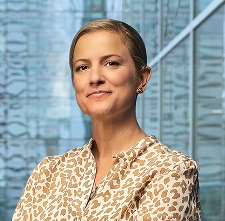Can you tell us about your background and how your role has evolved at Wellington?
I have worked at Wellington for almost 14 years – most of that time focused on ESG research and engagement. As a founding member of Wellington’s ESG team, I originally focused my time engaging with our public company investments on ESG factors across Wellington’s public equities and fixed income portfolios. What I learned from that experience was that newly public companies appeared overwhelmed and underprepared to address the ESG-related questions they received from investors. I remember wishing that I could have met with them a few years earlier to help them prepare for the public markets.
In 2020, I moved to our private investments platform to create a dedicated ESG team. My team works across our privates platform – from early-stage venture to late-stage growth – to integrate ESG considerations across the investment lifecycle pre- and post-investment.
How does ESG integration differ in private vs. public markets? Buyout vs. VC?
ESG integration started in public markets and then emerged later on in private markets. Private market investing is a natural fit for ESG integration – private investments are long-term, illiquid investments with multi-year ownership.
Given the depth of Wellington’s platform across both private and public markets, we want to help our private companies become the type of public companies we’d want to own on the other side of an IPO.
With private companies, we are in the trenches with them supporting their ESG journey and we know what the public markets expect. The earlier we can engage with companies on ESG topics, the better. Taking early action on ESG issues well in advance of an IPO when a company’s culture and decision-making remain nimble is more efficient than scrambling to get things in order right before or after going public.
One other interesting angle is the fact that we are minority shareholders -- we don't take controlling positions in any of our private portfolio companies, so we can't just enforce certain practices. Instead, we aim to bring founders and management teams along; we present the case that stronger ESG practices can translate into better returns, stronger brands and wider competitive moats, and broader access to capital.
“We want to help our private companies become the type of public companies we’d want to own on the other side of an IPO. The earlier we can engage with companies on ESG topics, the better.”
How do you engage with private companies on pre-IPO ESG preparedness? What do companies need to “get right” before going public?
When it comes to supporting companies on ESG strategy prior to an IPO, there is no “one-size-fits-all” approach. The process is bottom-up and the nature of our engagement varies based on the company’s industry, region, and lifecycle stage.
That said – corporate governance emerges most often as a primary focus of our engagement with private companies. If a company has the right governance structure in place, other practices will likely follow. Many private companies, especially early-stage ones, are extremely lean and hyper-focused on scaling the business. That’s where our team comes in. As an investor, we provide complementary ESG advisory support to portfolio companies early on, often leveraging Wellington’s in-house expertise.
Given the industries we invest in, our engagement with portfolio companies tends to center around governance issues, like board composition and executive compensation and shareholder rights, as well as social topics such as human capital management. For example, many of our portfolio companies have not yet hired a Chief People Officer or Human Resources Officer and look to us for guidance and tangible resources in areas like talent management, employee engagement, and DEI.
Cybersecurity and data privacy, responsible AI, and climate disclosure are other topics where we are increasingly receiving questions and will continue to be key focus areas in 2024.
“Many private companies, especially earlier stage ones, are extremely lean and hyper-focused on scaling the business . That’s where our team comes in. As an investor, we provide complementary ESG advisory support to portfolio companies early on, often leveraging Wellington’s in-house expertise.”
Many early-stage companies will often say that what they do is “inherently ESG.” How would you react to that? What are some common misconceptions of ESG that you’ve come across?
One issue that plagues the space currently is a conflation between ESG and impact. These two concepts are often grouped together when they are two distinct investment approaches.
ESG is about minimizing risk and maximizing value, while impact is about producing a positive external outcome from a company’s products or services. We have private companies in our portfolio that may be considered impact investments, but it does not always mean their own ESG practices are pristine; our team helps companies turn that sustainability lens inward on themselves.
At Wellington, we have a separate Impact Measurement & Management (IMM) team distinct from our ESG team. Our two teams will often look at the same topics but approach them from two different perspectives. Our portfolio companies appreciate that we have a dedicated IMM team, since they often want to know how to better track and communicate the external impact of their business.
A fair criticism of ESG is a tendency for ESG to be combined into a catch-all label. Distilling ESG to one concept and saying a company is inherently “good” or “bad” at it drives confusion, skepticism, and fatigue. Our team focuses on the topics that matter most for a given portfolio company and break down core issues across E, S, and G that are most relevant for the industry, region, and lifecycle stage. The future of ESG will focus on specific issues, not general concepts. Since every private company is different, they need to understand their unique issues to prepare for what awaits them when going public.
“The future of ESG will focus on specific issues, not general concepts. Since every private company is different, they need to understand their unique issues to prepare for what awaits them when going public.”

Moses Choi
Director, Sustainable Finance
Featured Guest:

Hillary Flynn
Director, ESG, Private Investments at Wellington Management